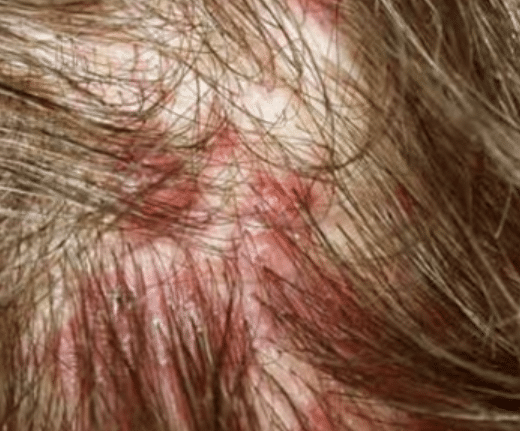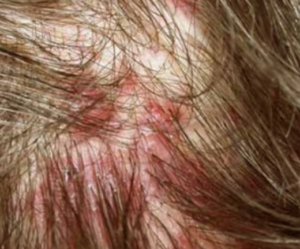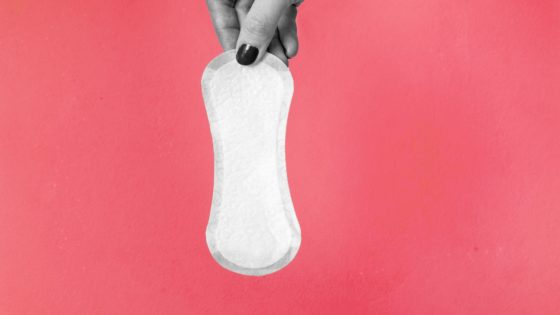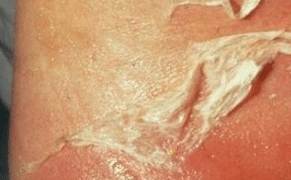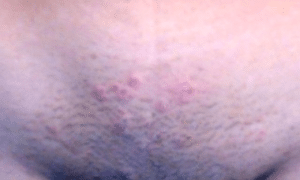Find insights for painful, itchy sores on scalp. Also causes, treatment and preventative measures have been enumerated.
Sores on Scalp Causes
Some of the sore on scalp causes include the following:
- SHINGLES
Shingles are painful rash that usually develop into fluid-filled blister and sores on the skin surface. Shingles are caused by a virus know as varicella zoster.
This virus also causes chicken pox .When you are infected by Varicella zoster especially after a chicken pox treatment; it remains in the body system in a dormant state. However, when the virus is activated, it can cause shingles to appear on the skin surface. Shingles can cause sores on the scalp, neck, back, legs, arms, face and any other part of the body.
- HEAD LICE
Head lice are parasitic insects that cause irritation and inflammation on the scalp. Once the irritation is scratched it causes open sores. These sore can develop into scabs on scalp when infected by bacteria or fungi.
Though head lice cannot transmit other infection, they (head lice) can spread very fast through direct contact with a person having it. The best way to deal with head lice is maintaining high standards of cleanliness.
- IMPETIGO ON SCALP
Impetigo is a bacterial infection that lead to dark rash and blisters on the affected area of the skin. Like any other parts of the skin, the scalp can also be affected by this condition. Impetigo is a common infection in infants, toddlers or young children. This infection is highly contagious.
- SEBORRHEIC DERMATITIS
The main cause of seborrheic dermatitis is not clearly known. However, the condition can affect anyone regardless of the age. Newborns, toddlers, teens and adults may show symptoms of seborrheic dermatitis, which manifest itself on the scalp in the form of dandruff with itchy flaky skin that form white patches. However in some cases, yellow or white sores that crust over the shaft of the hair can show up.
- SCALP PSORIOSIS
Scalp psoriasis manifest itself with symptoms such as patches of red, flaky skin on your scalp. Psoriasis on the scalp is usually itchy, a factor that lead to scratching that further result to bleeding and scabbing. Psoriasis being an autoimmune disorder needs a qualified doctor for treatment.
- SCALP CANCER
Cancer as a disease can cause bumps, tumors and sores on any part of the body including the scalp. When cancer affects the skin of the scalp it causes chronic development of sores like tumors that can bleed easily.
- EOSINOPHILIC FOLLICULITIS
This condition manifests itself as itchy sores on any part of the skin on the body. When eosinophilic folliculitis affects an area, the area may develop fluid-filled blisters that ooze out pus. This condition is common to people that affected with HIV/AIDS.
- CYSTS
Cysts are smooth, rigid lumps that can develop in your hair follicles that anchor each of your hair to the scalp. Cyst grows slowly and is usually harmless but in some cases they can get swollen and painful and may ooze thick pus with a bad smell. Cysts usually go away on their own but in case you find them uncomfortable you need to visit your doctor.
- RINGWORM ON SCALP
Ringworm is an infection that is caused by a fungus. When ringworm affects your head it causes patches of itchy skin and hair loss that can result to worse complications over time. Ringworm can also make you to get a painful, pus-filled sore called a kerion on your scalp.
Ringworm infection is quite common in infants, toddlers or children. Adults and teens can also be affected by fungal related infection on their scalp such as yeast infection if they have a weak or a compromised immune system. It also important to note that ringworm is highly contagious and can spread very fast from one person to another within a population.
- LICHEN PLANUS
Lichen planus is a condition that is common to individual of middle ages. Lichen planus cause red, pink or purple bumps on the surface of the skin .it can also result to painful sores on the scalp and loss of hair. However, it is also important to note that lichen planus on the scalp can stay on your skin even for many years without clearing away and in some cases this infection can result to permanent scarring on your scalp.
- CONTACT DERMATITIS
Contact dermatitis is a skin disorder that arises as a result of coming in contact with allergens, which then eventually forms an allergic reaction. Sometimes your scalp skin can form rashes and sores when it comes in direct contact with allergens or strange substances that can trigger a rapid allergic reaction to show up on the affected area.
There are many allergens that can cause an allergic reaction to your scalp skin and some of them include harsh shampoo, hair dyes, poison ivy or any strong hair treatment chemical. These products can irritate the scalp skin to form burns like sores.
- CHICKEN POX
Chicken pox in most cases, strikes the trunk or face and then moves outward, affecting the scalp and extremities. When chicken pox attacks the scalp it results to formation of sores and bumps. Treatment for chicken pox of the scalp focuses on symptomatic relief and skin hygiene to reduce the risk of secondary bacterial infections. Some patients also require antiviral drugs.
Painful Sores on Scalp
When any part of the skin is infected with sores this result to pain on the skin. The pain is usually due to a damaged tissue or nerve. Sores on scalp are more often accompanied by symptoms such as swelling, inflammation and burning.
Painful sores on the scalp skin need immediate attention as they can stimulate the nerve around the head region to cause headache and pain in the back of the neck. There many skin conditions that once they affect the scalp skin they cause severe nerve damage and pain, some of the conditions include lupus, dermatitis, shingles, skin cancer, insects bites, psoriasis, seborrheic dermatitis, eczema and contact dermatitis.
Painful sore on the scalp can be treated by using over the counter painkillers. In case you have used over the counter painkillers and the pain isn’t going away, you need to see a doctor for appropriate diagnosis and treatment.
Sores on Scalp Lupus
Lupus skin disorders occur due to malfunctioning of the body immune system that does not distinguish between the normal body cells and foreign pathogens in the body. In this circumstance, the immune system is stimulated to produce antibodies that attack healthy body cells and tissues. This reaction can manifest itself as inflammation of the skin with sores.
Lupus can seriously damage the skin and is more often accompanied by symptoms such as an itchy rash on the scalp or any other part of the body. Lupus can also result to inflammation of joints, damage to the liver, heart, kidney and lungs
Sores on Scalp Pictures
Sores on Scalp Treatment – Home Remedy
Sores on Scalp Treatment
If the sores on your scalp are as a result of an underlying medical condition or any other known cause your doctor will have to treat the underlying condition first or just treat the sores on the scalp using the following methods:
- Phototherapy
- Injections
- Medications, which may include antifungal or antibiotic drugs
- Topical creams and ointments
Home Remedies for Sores on Scalp
There are over 50 ingredients that can be used to treat soreness on scalp at home. Some among the have been discussed below. Choose any among them that may be appealing or convenient to you.
Baking soda
Baking soda is alkaline in nature. This property plays a role balancing the PH levels and provides relief from itchiness. Baking soda exfoliates the scalp skin and prevents dandruff which is caused by overactive fungi.
- Apply few drops of olive oil on your scalp and rub gently for a few minutes.
- Mix 2 tablespoon of baking soda in water to form a paste.
- Apply the paste directly on your scalp and let the paste sit on your scalp for 20 minutes.
- Rinse with your scalp with lukewarm water.
- Repeat this process 2 times a day for 1 week to get rid of scalp sores.
Witch Hazel
Witch hazel is a natural astringent which help to get rid of itchiness on the scalp by reducing inflammation.
- Mix one part of witch hazel oil with two parts of water.
- Soak your scalp thoroughly with this remedy.
- Massage your scalp gently for 20 minutes,
- Then, rinse the scalp with warm water
- Repeat this process 2 times a day for 1 week to get rid of sores on scalp.
Olive Oil, Mayonnaise and Broccoli Puree
Mayonnaise helps to hydrate the scalp, clears the lice and adds a shining to your hair while broccoli thoroughly cleanses the dandruff from hair. Olive oil has anti-fungal and anti-bacterial properties that help to kill the fungi and bacteria causing soreness on your scalp.
- Mix equal parts of olive oil, and mayonnaise and stir thoroughly.
- Blend a handful of broccoli into a paste by adding a few drops of water.
- Add the broccoli paste to the mixture of mayonnaise and olive oil.
- Rub your scalp with this mixture and leave it on for 30 minutes.
- Rinse your hair afterwards thoroughly using warm water.
- Repeat this process 2 to 3 times a day for 1 week.
Eucalyptus Oil
Eucalyptus oil has ingredients that contain antiseptic and anti-fungal properties that help to fight of the scalp infections. Eucalyptus oil also prevents any accumulation of residue and clogged pores which can cause dryness, dandruff and itchiness. It is also helpful in providing relief from mild psoriasis.
- Mix 3 tablespoon of white vinegar powder, with 3 tablespoon of eucalyptus oil and 2 cups of water
- Using this mixture solution, rinse your hair thoroughly until the whole scalp is soaked.
- Gently massage your scalp for 20 minutes
- Then, rinse your hair with mild shampoo and water.
- Repeat this process as many times as you can for faster relief of scalp soreness.
Tea Tree Oil
Tea tree oil has ingredients that contain components such as terpinen-4-oil, which are anti-fungal, anti-septic, anti-inflammatory and anti-bacterial in nature. This properties help to fight off bacteria, fungi and itchiness. Tea tree oil also helps to unclog hair follicles.
- Dilute 5 drops in 2 tablespoon of coconut oil.
- Apply this mixture on your scalp and rub thoroughly for 3 minutes.
- Massage your scalp gently to unclog your hair follicles and get relief from itching.
- Leave the mixture of coconut oil and tea tree oil to sit on your scalp for 1 hour.
- Then, rinse your scalp with mild shampoo and water.
- Repeat this process once a day for 1 week.
Apple Cider Vinegar (ACV)
Apple cider vinegar (ACV) balances scalp PH levels this helps to relieve itchiness and makes it difficult for fungal and bacteria to operate and cause infections. Also the Apple Cider Vinegar (ACV)contains acetic acid which act as a natural cleaning agent, which exfoliates the dead skin cells that clog the scalp skin pores.
- Rinse your hair and scalp with water, and let it dry completely.
- Mix equal parts of apple cider vinegar (ACV) and water.
- Then, pour the solution into a spray bottle.
- Spray it on your scalp
- Wrap your head with towel or shower cap. Leave it on for 30 minutes.
- Wash off with mild shampoo and water.
- Repeat this process twice a day for 1 week.
Sesame Seed Oil
Sesame seed oil helps to get rid head lice hence reducing itchiness on the scalp. It also contains nourishing, lubricating properties that locks the moisture, prevent dryness and help to keep the hair follicles open. Sesame seed oil also has astringent properties that facilitate healing of sores on scalp.
- Gently heat sesame seed oil
- Apply this warm oil onto your scalp and massage gently for 10 minutes before going to bed.
- Wrap your head in hot towel and leave it for ten minutes and then take it off.
- The, morning rinse your hair and scalp thoroughly with shampoo
- Repeat this process 4 times a week.
Jojoba Oil
Jojoba oil has nourishing and lubricating properties that help to maintain scalp health. Jojoba also helps to fight inflammation on the scalp skin by preventing dryness. It also heals the scalp soreness by clearing the fungi and bacteria.
- Apply few drops of jojoba oil on your scalp.
- Using circular motions, massage your scalp with jojoba oil for 10 minutes.
- Leave it to sit for 2 hours or overnight.
- Then wash your hair with mild shampoo.
- Repeat this process 3 times a week.
Coconut Oil
Coconut oil has antibacterial and antifungal properties which fight off the bacteria causing folliculitis and fungal infections like ringworm on scalp. Coconut oil also act as a moisturizing agent that keeps your scalp moisturized and reduce dryness.
- Slightly warm up coconut oil and then apply it on your scalp.
- Massage your scalp in circular motions for 10 minutes.
- Using a towel or shower cap, wrap your head.
- Let the scalp absorb the oil for 2 hours or overnight.
- Rinse off with fragrance and chemical free soap and water.
- Repeat this process 4 times a week.
- Alternatively, you can add a few drops of coconut oil into your shampoo while washing your hair.
Chamomile Spray
Chamomile has anti-inflammatory and antifungal properties that make it effective to cure scalp soreness. It also soothes the itchiness as well.
- Take a handful of chamomile flowers and add 2 cups of water to it then boil the mixture.
- Boil the mixture till the color of the flowers changes.
- Allow the mixture to cool down.
- Then, strain and pour the solution into a clean spray bottle and refrigerate.
- Spray the solution on your scalp till your scalp hair fill soaked.
- Alternatively, if you don’t have a spray bottle you can apply the solution using a cotton ball.
- Repeat this application as many times as you can to get rid of scalp soreness.
How to Prevent Sores on your Scalp
- Change your hair products regularly: Using one hair product for a very long time causes the stubborn chemical elements to accumulate on your scalp, which with time prove difficult to remove even with shampoo.
- Always use fragrance and alcohol free hair care solutions: Shampoos that contain alcohol and other harmful chemicals can remove the natural oils and affect the PH balance. Always make sure you have checked the ingredients list of any shampoo before buying it.
- Make sure you have dried your hair properly after washing or bath: Damp hair and moist environment are breeding grounds for ringworm and other microbes that cause soreness on scalp. So it’s recommended you wash your hair after every wash.
- Avoid scalp Sunburn: It’s always advisable to cover your head with a cap, scarf or umbrella when going out on hot sun to avoid sunburn which causes itching, irritation and other discomforts.
- Avoid foods that facilitate yeast growth: Stay away from foods that help yeast growth such as sugar, alcohol, refined carbohydrates like paste or white bread, mushrooms, peanuts and vinegar. Restricting your diet from these foods helps your body to get rid of yeast naturally.
- Drink plenty of water: Keeping yourself hydrated is very important. Lack of water in the body can lead to dry skin and scalp. Drink 8 to 10 glasses of water.
- Comb your hair regularly: Combing hair help to remove dandruff and dust from the hair, this result to a healthy hair and scalp as well.
Further References


